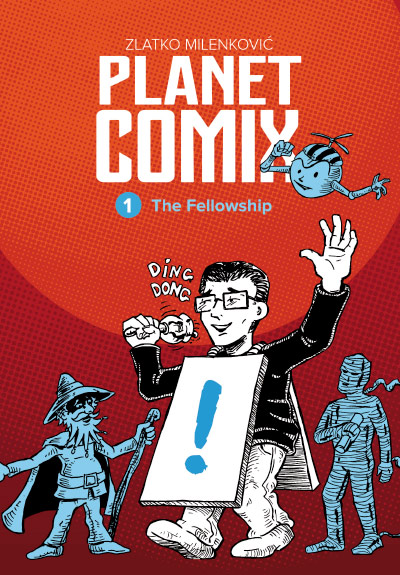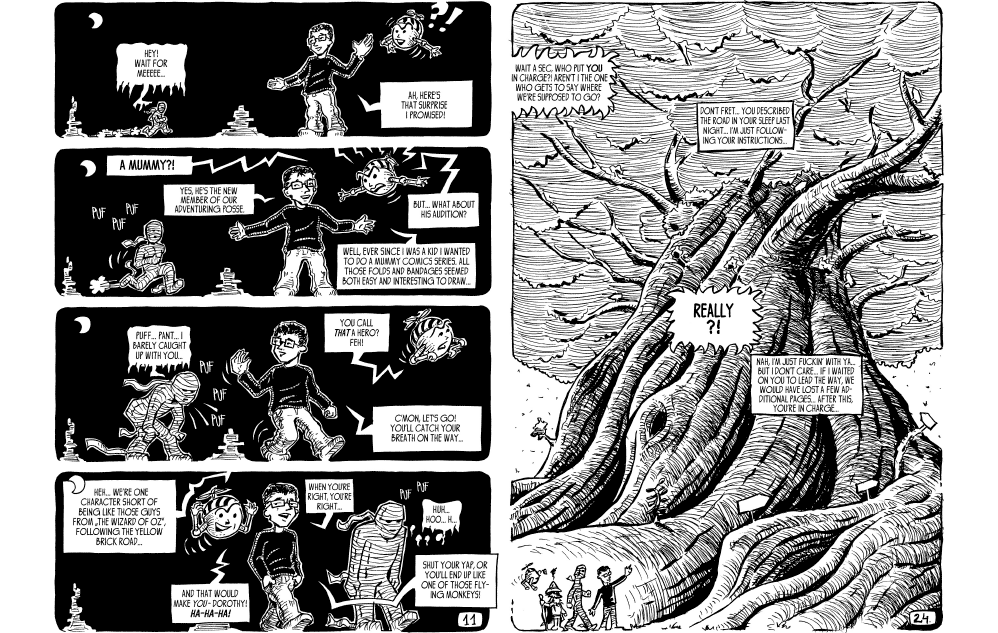| Created worlds… | |
THE SUBJECTIVE SQUARE.
CREATED WORLDS THE SUBJECTIVE SQUARE For decades now Zlatko Milenković has been an active and generous comic-book figure on the Serbian scene, be it through his regularly published Comics news, or via his layouts, lettering and retouching work for various publishing houses. Realizing that time marches on and he hasn’t managed to produce enough of his own comics, Milenković decides to take it step-by-step, determined to somewhat regularly create a comic-book series page by page, without any concretely set plans, to see where his creativity will take him. Thanks to such an approach, every new page also provided a new opportunity for Milenković to draw precisely what he felt like drawing at that time, which is particularly noticeable in his dramatic, lively brushstrokes. By taking a stroll as a character through his own comic, Milenković also takes a stroll through his own comic-book-obsessed psyche. Each page gives us an interesting new panel layout, or a new reference to one of his favourite works of the Ninth Art, cinema or paintings, as well as some new insight into his most intimate thoughts, grudges, but also the noticeable exhilaration caused by the fact he is finally creating without any limitations. Planet Comix: The Fellowship serves as a reprimand to any and all creative dormancy, especially that of its own author.
|
|
Published: Politika (Daily), Belgrade, Serbia, 13. February 2021. |
| Great hardships of a comic book artist and his heroes… | |
by Zlatko Milenković; published by “ZMComics”, 2020. GREAT HARDSHIPS OF A COMIC BOOK ARTIST AND HIS HEROES Zlatko Milenković (1969.) is well known to local comic book fans as one of the most agile comic book workers, or as they used to call them back in the day, “yeomen”. His comic books have appeared in many various publications and several self-contained albums, he was part of the editorial staff of the acclaimed comic book magazine “Stripoteka”, and as a “freelancer” he worked as the prepress technician on numerous comic book publications. Way back in 1998. he launched a unique internet publication “Strip vesti” (Comics news) which became a respectable news source, chronicling all the happenings on the regional comic book scene. Long-term duties on numerous projects led to a chronic lack of time for thinking up and drawing his own comics. Still, his need to create could not be stifled. One way to preserve that creative flame, or rather, author’s attempt to force himself to work on new comics was to create a fanzine “Samo strip...” (“Just a Comic...”) back in December 2012, which, albeit published infrequently (usually just one issue a year), became a showcase for Milenković’s new and older works (as well as comics or articles by occasional guest-creators). The main, or rather “featured” sequential story in each issue is the “Just a comic...” series which Milenković later published in a black-and-white volume under the title “Planet Comix”, containing the entire first story called “The Fellowship”, as well as a series of homages and pin-up illustrations by his comic book artist colleagues exclusively printed as backmatter of this album. An inquisitive reader of “Just a Comic...” will discover and follow two separate but interconnected tales. The protagonist of the main story is an artist who looks very much like Milenković, complaining about not having enough time to create, and therefore he promises both to himself and his audience (whom he keeps addressing, breaking the 4th wall) that in the future he will keep drawing comic book pages (probably in accordance with the old Latin adage, nula dies sine linea), even when he doesn’t have any idea what their content may be, following the example of Moebius’ „Airtight Garage“ which was created just so – without a script or any sort of plan (using the Surrealistic method of so-called „automatic writing“); and since drawing also serves a therapeutic purpose, the author will draw everything he ever wanted, regardless of whether or not it fits with the plot thus far. This self-deprecating and open-minded self-awareness, which erases the arranged and established relationships between the artist and the consumer, is one of the staples of the alternative self-published comics and gives us a chance to not only witness the creative process itself, but also the direct communication between the creator and his heroes. Thus the aforementioned comic book artist holds an open audition for the protagonist of his comic, and after casting his desired candidate – a metal ball with arms and a propeller-hat – they move on to further adventures; the second member of this fellowship wins his spot without an audition (but rather via nepotism) solely because the author always wanted to draw mummies (and this particular mummy also has an degree in economics!), and the third one is the dwarfling (the only fairydwarf in the world, product of a sinful relationship between a fairy and a dwarf), a character previously created by the author, who simply never got around to writing and drawing his adventures. This makeshift company – along with the author himself, who tags along to both cheer and criticize them – in accordance with the well-established epic fantasy clichés, embarks on a voyage through the underground labyrinth on a very important rescue mission: instead of a “fair maiden” they have to free a fat mare from the clutches of the evil dragon. They will fulfil that mission with a little help from a flying hero who will, after several twists and turns, lead the merry gang to a robo-gadget, which will in turn put them on a cubical spaceship, and send them off on a new mission (very much reminiscent of the Star Trek TV shows)...
Milenković’s nonchalant (anti)story is chock-full of witticisms and parodies of established models from the arsenal of contemporary pop-culture, and from panel to panel it subverts patterns that the reader is already used to, thanks to a steady diet of cookie-cutter genre content. Still, the goal of this parody isn’t to prove the author’s own intellectual superiority, since its creator is far from a completely focused persona with any clear-cut aesthetic worldview; instead of a monolithic artist, the readers here have a chance to see a creator almost „on the brink of a nervous breakdown “, who is trying to save his personality through creative work. Therefore, the artist comes up with and is joined only by heroes that are within his reach, which also works the other way around (or, as the old proverb goes: „there’s a lid for every pot“). Within that context, even the artwork itself is adequately inadequate: it doesn’t adhere too much to any classical drawing rules, but contains many a clever solution; it’s not precise, but has plenty of more than welcome messiness. Milenković’s ability to persuade the readers to buy into his tale – its spontaneity and its casual tone – works flawlessly and provides us with an (un)expectedly refreshing direction on the trail of that noble pursuit: achieving freedom whilst creating comics. ILIJA BAKIĆ Links: |
|
Published: Dnevnik (Daily), Novi Sad, Serbia, 23. August 2020. |


